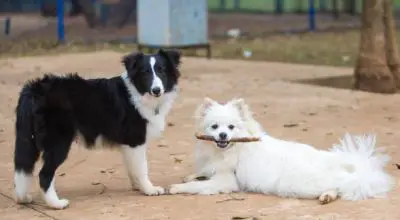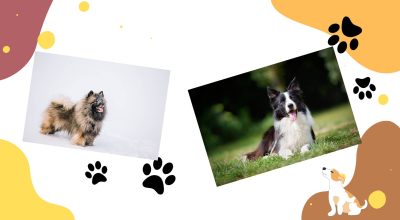The Border Collie has long been revered for its exceptional blend of intelligence, playfulness, and amiable nature, setting it apart as a truly remarkable canine companion. In contrast, the Shiba Inu breed possesses a distinct heritage rooted in its original purpose of flushing out birds and small animals, and occasionally aiding in wild boar hunts.
Among the diverse array of dog breeds, the Border Collie stands out as an exceptional and distinctive variety deserving of both admiration and reverence especially for farmers and herders. At the same time, Shiba Inu is regarded as one of Japan’s 6 original breeds, including the Akita (large), Kai, Shikoku, Kishu, Hokkaido (medium), and Shiba (small) holding a unique position.
Characteristics of Border Collie and Shiba Inu
The Border Collie, deriving its name from the Anglo-Scottish border region, is primarily recognized as a herding breed. Originally bred for the specific purpose of herding sheep, these dogs possess exceptional intelligence and are highly adaptable to various tasks. Their quick learning ability is a testament to their remarkable cognitive prowess. However, their high intelligence also means that they require substantial mental stimulation and benefit greatly from having a designated job or purpose, which can make them a handful for the average family.
Within the Shiba Inu breed, the sesame coloration is a rare occurrence. Originating in Japan, similar to the breed as a whole, Sesame Shiba Inus exhibit a stunning and distinct variation in their coat color. This unique coloration sets them apart, and they are often referred to as “Sesame Tigers” due to the striking resemblance to the coat patterns of a tiger. While retaining all the characteristics of a typical Shiba Inu, their eye-catching coat makes them stand out in a crowd, adding to their charm and allure.
History of Breeds
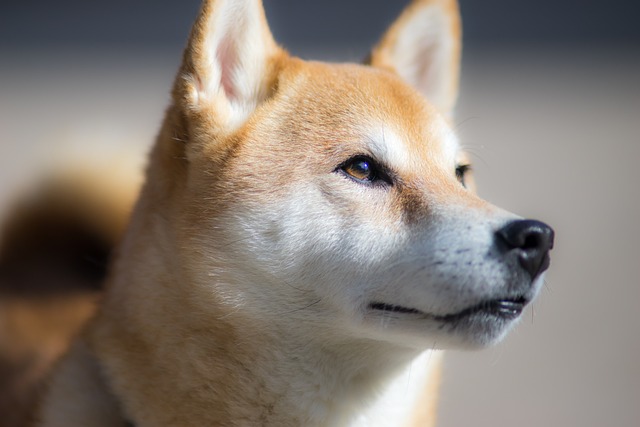
The Border Collie originated in Great Britain and was specifically bred as a sheepdog, trained to work closely with its handler and adept at herding various types of livestock. The breed is believed to have ancestral ties to reindeer herding dogs introduced to Scotland by the Vikings.
By crossing these dogs with Valee Sheepdogs, breeders successfully developed what is now known as the Border Collie. While initially referred to as “Sheepdogs” for several decades, the breed officially received the name “Border Collie” around 1915. This name choice reflects the breed’s development along the Anglo-Scottish border in the region of Northumberland.
On the other hand, Shiba Inus are an ancient breed with a history spanning at least 2,000 years. Initially employed as working dogs primarily for hunting purposes, these versatile canines fulfilled multiple roles in ancient times, as was common among many dog breeds. Over time, they gradually became more prevalent as both guard dogs and loyal companions. Their protective nature and loyalty contribute to their effectiveness as guard dogs. While Sesame Shiba Inus have likely existed since the breed’s inception, official mentions of this particular coloration did not emerge until more modern times.
Appearance Comparison between Border Collie and Shiba Inu
According to the breed standard, the Border Collie is a harmoniously built dog that exudes both agility and grace. With a keen and alert expression, this breed possesses oval-shaped eyes, typically dark in color, although blue eyes are commonly observed in merle-colored Borders. The Border Collie’s ears are triangular in shape, and they can either be erect or semi-erect, contributing to their vigilant appearance.
In contrast, the Shiba Inu is known for its confident expression. Their heads are well-proportioned in relation to their bodies, characterized by broad foreheads and endearing full cheeks. The eyes of Shiba Inus are slightly triangular, with dark brown irises and black eye rims.
These eyes are deep-set and slant slightly upwards, often likened to the appearance of foxes. The breed’s ears are small and triangular, pointing upwards with a slight forward tilt. Shibas have black noses and lips, while their muzzles are firm and full, tapering slightly from the stop to the tip of the nose. These distinct facial features contribute to the unique and captivating look of the Shiba Inu breed.
Size
The Border Collie is classified as a medium-sized dog breed. Adult males typically have a maximum weight of about 45 pounds (20 kg) and an average height of around 22 inches (56 cm). Similarly, adult females generally stand at approximately 21 inches (53 cm) tall and weigh up to approximately 42 pounds (19 kg). Their average height also hovers around 21 inches (53 cm).
Compared to their larger counterparts, Shiba Inus are slightly smaller, making them an appealing choice for many dog owners. Adult male Shiba Inus generally have a height ranging from 14 to 16 inches and weigh approximately 23 pounds. Similarly, adult females of this breed typically stand at 13 to 15 inches and weigh around 17 pounds. Their compact yet charming stature adds to their allure as beloved companions. If you’re considering a Shiba Inu, you can look forward to a delightful and manageable-sized dog that brings joy to your home.
Coats & Colors
The Border Collie breed standard presents a delightful array of coat colors, offering many options for prospective and current dog owners to appreciate. These colors include black, blue, blue merle, brindle, gold, and more! In show rings, it’s considered desirable for the color of a Border Collie’s ears to match the primary color of its body, enhancing its overall appearance. Additionally, it’s not unusual to come across uniquely spotted coat color combinations, which only adds to the breed’s visual appeal and undeniable charm. Whether you’re a potential owner or already have a Border Collie, discovering the various coat colors of this remarkable breed can be a delightful journey.
The Shiba Inu standard, on the other hand, allows for four different coat colors:
- Red
- Black and tan
- Sesame
- Cream
Cream-colored Shiba Inus cannot display the urajiro markings, and as a result, this coat color is penalized in AKC shows. Red is the most popular and iconic coat color for the breed, resembling a toasted marshmallow appearance.
Black and tan Shibas, considered tri-colored, have a rusty black base with tan points and appropriate urajiro markings. Sesame-colored Shibas are the rarest, and finding a “true” sesame dog can be challenging. They have a red base coat with a black-tipped overlay, with no heavy concentration of black allowed. Widow’s peaks on a sesame-colored Shiba are permissible according to the standard.
Personality & Temperament Comparison
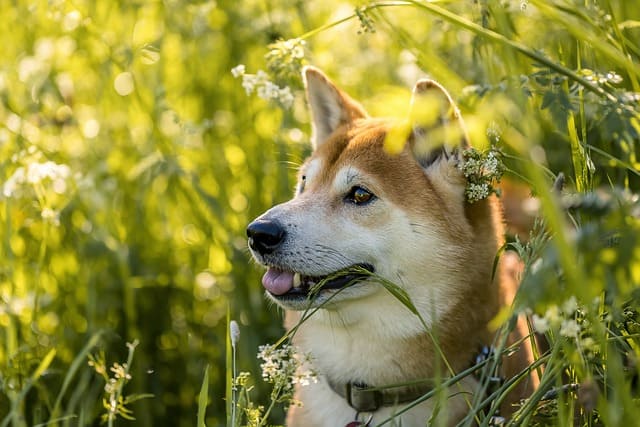
Due to their origin in the Scottish countryside, Border Collies have a natural inclination towards physically demanding activities. They are not inclined to stay idle in confined spaces or indoors, making them unsuitable for apartment living. Having access to extensive fields or a spacious backyard is essential if you are considering this high-energy breed as a family pet.
Border Collies are not known for their quietness or calmness; in fact, they are quite vocal and tend to bark frequently, easily stimulated by objects in motion. As a result, it is common for them to chase cars, bikes, and skateboards.
In terms of temperament, well-bred Shiba Inus are known to be good-natured, alert, and bold. They possess a strong-willed and confident nature, often having their own ideas about things. While they are loyal and affectionate with their families, they tend to be suspicious of strangers.
Sharing is not a strong suit for Shiba Inus, as they may exhibit guarding behavior, sometimes even aggressively, over their food, toys, or territory. Additionally, they may not always get along well with other dogs, particularly if they are intact. Their instinct to chase small animals considered prey can also be prevalent.
Family
Border Collies can indeed make excellent family dogs, regardless of whether you choose a male or female. However, it is worth noting that females often display a slightly calmer temperament compared to males.
This breed is not inherently aggressive and generally gets along well with children, provided that the children are educated on how to properly interact with dogs. Border Collies are friendly by nature and typically enjoy being in the company of their human family members.
Shiba Inus are renowned for their loyalty and friendliness, making them wonderful companions for many. However, it’s important to note that they have a somewhat impatient side and may be easily provoked by children. Understanding and respecting their temperament can foster a positive and harmonious relationship with these charming dogs.
By maintaining a watchful eye and taking appropriate precautions, you can help ensure a harmonious and happy environment for both the Shiba Inu and the children.
Kids
While some Border Collies may face challenges in getting along with children creating a positive relationship and providing mental and physical stimulation is key to fostering a rewarding companionship for the dog and the family.
The suitability of a Border Collie for a family will depend on factors such as proper training, socialization, and meeting their exercise needs. With appropriate behavioral management and a well-rounded approach to their care, Border Collies can coexist harmoniously with children in a family environment.
In the case of Shiba Inus, responsible pet owners can create a harmonious environment by providing the necessary care and attention to their dogs. This ensures a positive and enjoyable experience for the dog and the children.
This is particularly true when the Shiba has been raised from a young puppy with a focus on socialization. As Shibas are typically calm by nature, they can help bring a sense of calmness to a child who may be full of energy. The key lies in providing a positive and nurturing environment for both the Shiba Inu and the child, fostering a harmonious relationship between them.
Other People
Like many herding breeds, the Border Collie has a natural protective instinct, which can make them wary of strangers. Early and consistent socialization is crucial to prevent them from developing shyness or aggression towards unfamiliar people.
Moreover, it’s important to be aware that Border Collies possess high sensitivity to sound. This makes them susceptible to developing noise phobias if not properly exposed to loud or unexpected noises from an early age. The silver lining here is their acute sensitivity also empowers them to excel as watchdogs, diligently alerting you to any unusual occurrences or the presence of unfamiliar individuals.
The Shiba Inu is characterized by its alertness, fearlessness, and faithfulness. When it comes to strangers, Shiba Inus tend to be cautious and reserved. They are fiercely loyal to their owners and display a strong sense of protectiveness towards them.
When encountering a new stranger, a Shiba Inu will closely observe their every move and may take time to establish trust. Building trust and loyalty with a Shiba Inu can require months of dedicated training, hard work, and devotion. It is important to understand and respect their cautious nature when introducing them to new people.
Dogs & Other Animals
Herding dogs like Border Collies generally have the ability to coexist with other animals. However, it can be unpredictable whether other animals will get along with a Border Collie. For instance, certain Border Collies and cats may have a harmonious relationship, but it requires the cat to tolerate being herded and frequently checked on. While some cats may tolerate the herding behavior, others may not. If the cats remain still, the Border Collie will likely leave them alone, as movement triggers the herding instinct.
In some cases, cats may playfully swipe at the Border Collie before running away, initiating an interaction. However, it’s important to note that Border Collies with strong predatory drives can pose a danger to cats. If you currently own or plan to get a cat, it is advisable to consider adopting an adult Border Collie who has undergone cat compatibility testing.
On the other hand, Shiba Inus have a history of displaying aggression towards other canines. They often have poor compatibility with other dogs and may prefer to live as the only dog in the household. It’s crucial to remember that each Shiba Inu is unique and may have different inclinations. Some Shiba Inus might prefer the company of other Shiba Inus over dogs of different breeds.
Due to their aggressive and territorial temperament, Shiba Inus may prefer the companionship of Shiba Inus of the opposite sex. When considering introducing another dog into a household with a Shiba Inu, careful introduction and monitoring are essential to ensure a peaceful and secure environment for everyone involved.
Behaviour Issues
Border Collies have a high energy level and a need for mental stimulation. Without the right balance of physical exercise and mental engagement, they can become bored and exhibit destructive behavior at home.
It is important to follow guidelines provided by Border Collie professionals to ensure they feel fulfilled. Simply taking them for a short walk to the end of the road is not sufficient. Even after a longer walk, young Border Collies may still have abundant energy, and they may engage in naughty behavior if not properly stimulated. Therefore, it is essential to provide them with adequate exercise and mental enrichment to prevent boredom.
Similarly, Shiba Inus are also high-energy and highly intelligent dogs. They require both physical and mental stimulation to stay balanced and avoid anxious behavior. If not provided with sufficient exercise and mental challenges, Shiba Inus can be prone to anxiety and may exhibit behaviors indicative of frustration.
They can be stubborn and may resort to mouthing and biting to express their displeasure or frustration. It is important to meet their exercise and mental stimulation needs to help them stay calm and content.
Training & Exercise
Border Collies are highly energetic dogs that require both physical exercise and mental stimulation. Living in an apartment may not be suitable for them unless you are an active individual who can provide them with extensive exercise, such as running or participating in marathons. Having a fenced-in backyard is recommended to allow them to release their energy.
Socialization is crucial, so it’s important to expose them to various environments and take them with you whenever possible. Training a Border Collie is relatively easy, but the challenge lies in keeping them engaged due to their intelligence and herding instincts. Finding enjoyable activities for both you and your Border Collie is essential to keep them interested and fulfilled.
Shiba Inus also require a significant amount of exercise, ideally at least an hour each day. Insufficient exercise may lead to destructive behavior or excessive barking. Socializing them with people and other dogs is important, and they should be well-behaved when off-leash outdoors. Shiba Inus enjoy activities like running, hiking, playing fetch, and participating in agility training to keep them physically and mentally stimulated.
Taking Care & Maintenance Border Collie and Shiba Inu
Border Collies indeed require a high level of maintenance and an active lifestyle. They thrive in an environment where they receive plenty of exercise, playtime, and mental stimulation. Their herding instincts can be strong, so engaging them in activities that mimic their natural instincts, such as herding games or agility training, can be beneficial. They have a weather-resistant coat that allows them to tolerate different weather conditions, and a fenced-in yard provides them with space to run and release their energy.
Shiba Inus can adapt well to apartment living due to their clean nature and ease of housebreaking. They are generally good indoor dogs and enjoy being close to their family. However, it’s important to provide them with sufficient physical exercise and mental stimulation to prevent destructive behavior. Shiba Inus are known for their vocalizations and may produce a loud scream or other vocal sounds to get attention. Consistent training can help manage and address their vocal tendencies effectively.
Grooming Difference
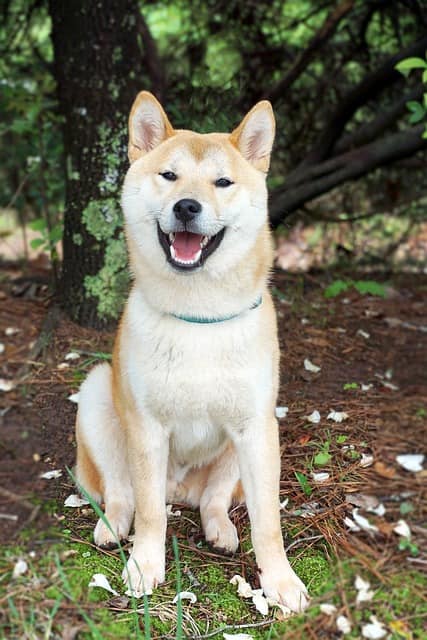
Border Collies have average grooming requirements, so professional hair clipping is not necessary. Regular brushing helps reduce shedding, and it’s important to regularly clean their ears and eyes to prevent infections. Additionally, administering seasonal flea treatment is crucial. Occasional baths and nail trimming can also be beneficial for them.
Shiba Inus have a double coat that sheds heavily twice a year and moderately throughout the rest of the year. Weekly or biweekly brushing is sufficient during non-shedding periods, but more frequent brushing is recommended during shedding seasons.
Shiba Inus are generally meticulous groomers and keep themselves clean, although occasional baths may be needed. It’s important to note that their coat is naturally waterproof, so there is no need to shave or alter it. Regular nail trimming is necessary to prevent nail-related issues, although Shiba Inus can be challenging to work with in this aspect. Starting to handle their feet and trim their nails when they are young can help prevent difficulties or resistant behavior in the future.
Shedding
Border Collies are known for their heavy shedding, especially during the fall and spring seasons. Their long, double-coated fur requires regular maintenance to keep up with the shedding. Collie hair can be found everywhere, from corners of the house to carpets and furniture. It seems to have a mind of its own, continuously reappearing even after cleaning.
Similarly, Shiba Inus are also a high-shedding breed. They shed consistently throughout the year, with two periods of intensified shedding when they blow their undercoat. This shedding phase lasts for about 3-4 weeks and results in increased shedding. However, compared to the Border Collie, Shiba Inus are relatively easier to groom, and regular brushing is usually sufficient to manage their shedding.
Health Comparison
While the Border Collie is considered a relatively healthy breed, it’s important to be aware of certain health issues that can affect them due to their long lifespan and age of the breed. Familiarizing yourself with these concerns, along with their prevention and treatment options, is crucial before bringing a Border Collie into your home. This will ensure that you can provide the necessary care to keep your new companion healthy and happy throughout their life.
Despite their overall good health, there are a few specific issues that potential Shiba Inu owners should be mindful of. Being aware of these health concerns will help you take proactive measures to maintain the well-being of your Shiba Inu and ensure they lead a healthy and fulfilling life.
Life Span
Border Collies are known to be a healthy breed, typically enjoying an average lifespan of 12-15 years. With proper care, including regular vet check-ups, a balanced diet, exercise, and attention to their overall well-being, Border Collies can lead long and healthy lives.
Similarly, Shiba Inus are generally considered a healthy breed with an average lifespan of 12-13 years. By providing them with proper nutrition, regular veterinary care, exercise, and mental stimulation, you can help ensure that your Shiba Inu maintains good health and enjoys a fulfilling life by your side. Remember to stay attentive to their specific needs and monitor their overall well-being to promote their longevity and quality of life.
Diet & Nutrition
To ensure the proper nutrition for a Border Collie, it is recommended to feed them a high-quality food that is specifically formulated for active dogs. This type of food should have increased protein content to support their high activity level and promote muscle development.
Look for foods that are also rich in omega-3 fatty acids, which are beneficial for maintaining a healthy coat and joints. Additionally, it is important to choose a age-appropriate food for your Border Collie. A high-quality puppy food can be fed until they reach 12-18 months of age, at which point you can transition them to an adult stage food.
Shiba Inus, a smaller breed, typically needs less food than bigger dogs. However, ensuring they receive the right nutrition is vital by providing a complete and balanced premium dry food blend. This specially formulated food should meet their specific nutritional needs, which include essential elements such as balanced levels of protein, fat, and carbohydrates, along with crucial vitamins, minerals, and antioxidants.
It is highly recommended to consult with a veterinarian to determine the most suitable and well-balanced diet for your Shiba Inu, as individual pets may have unique dietary requirements. Regular veterinary check-ups and discussions about nutrition can help ensure that your Shiba Inu remains healthy and receives the appropriate diet for their specific needs.
Health Issues
Border Collies, like any other dog breed, are susceptible to certain health issues. It’s important for owners to be aware of these potential ailments and provide appropriate care. Some common health concerns in Border Collies include:
- Musculoskeletal disorders: Border Collies, especially those with high energy levels, may develop musculoskeletal issues such as hip dysplasia or osteochondritis dissecans (OCD). These conditions can cause pain and discomfort in the joints and may require veterinary intervention.
- Dental issues: Border Collies have a higher risk of dental disorders, including tartar and plaque buildup, which can lead to cavities and tooth loss. Regular dental care, such as brushing and professional cleanings, is essential for maintaining their oral health.
- Neurological disorders: While Border Collies are known for their energy, they are also predisposed to canine epilepsy. Idiopathic epilepsy is the most common form of epilepsy seen in this breed and can require management and treatment by a veterinarian.
Similarly, Shiba Inus have their own set of health concerns that owners should be aware of:
- Hip dysplasia: Shiba Inus can develop hip dysplasia, a condition where the hip joint is misaligned, causing pain and discomfort. Proper preventive measures and regular veterinary care can help manage this condition.
- Eye problems: Shiba Inus may be prone to eye issues, including glaucoma, which can lead to blindness and discomfort. Signs such as watery eyes, a bluish cornea, redness, or squinting should be evaluated by a veterinarian.
- Patellar luxation: This condition involves the dislocation of the kneecap and can range from mild to severe. Treatment options vary depending on the severity, with mild cases often managed through medication and more severe cases requiring surgery.
Cost of breeding a Border Collie and Shiba Inu
When it comes to purchasing a Border Collie, the price can vary depending on factors such as the puppy’s quality and whether it’s intended for show purposes. Show-quality puppies tend to be more expensive, often exceeding the higher end of the budget. However, for most owners who are not specifically looking for show dogs, the cost of a purebred Border Collie typically ranges from $600 to $1,200.
In the case of Shiba Inu puppies, the price can also vary depending on factors such as registration and the reputation of the breeder. Shiba Inu puppies with limited registration from reputable breeders generally cost between $1,400 and $2,200. Puppies with full registration typically fall within the range of $2,000 to $3,500.
Puppies
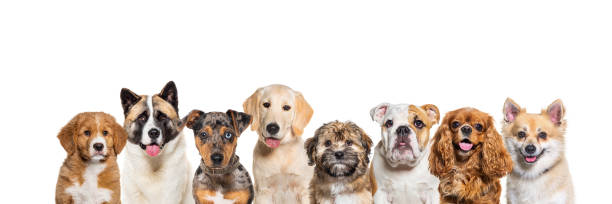
Typically, when purchasing a Border Collie puppy from a reputable breeder, the average price ranges from $800 to $1,500. However, for a top-quality Border Collie puppy with exceptional traits and lineage, the cost can go as high as $3,500 and even higher. The specific factors that influence the price include the puppy’s age, gender, quality, pedigree, and the location of the breeder.
In the case of Shiba Inus, the purebred Japanese variety tends to be more expensive. On average, the cost of a pet quality Shiba Inu puppy from a reputable breeder range from $1,500 to $2,500. However, if you’re seeking a Shiba Inu puppy with superior breed lines and an outstanding pedigree, the price can be higher, typically falling between $3,500 and $5,000.
Breeders & Centers
Adopting a Border Collie puppy can be an affordable option, with adoption fees ranging from around $200 to $400. Many shelters and animal rescue centers offer this breed for adoption. It’s important to note that the adoption fees may vary depending on your location and the specific rescue center you choose.
These fees often cover veterinary examinations, spaying or neutering procedures, and sometimes even basic training lessons at a discounted price, ranging from $100 to $300. Adopting a rescued Border Collie not only provides a loving home for a deserving dog but also supports the important work of animal rescue organizations.
For those interested in a Shiba Inu, adopting an older dog from shelters or rescue centers can be a cost-effective option. The adoption fees for adult Shiba Inus generally range from $300 to $550, which typically includes necessary vaccinations. Choosing to adopt a Shiba Inu not only offers a second chance to a deserving dog but also helps reduce the number of dogs in shelters.
Conclusion: Which Is Better, Border Collie or Shiba Inu?
In conclusion, when comparing the Shiba Inu and Border Collie breeds, it’s important to consider their unique characteristics, requirements, and preferences. Border Collies, known for their high intelligence and energy levels, require significant mental and physical stimulation.
They excel in activities like obedience training, agility, and herding. Border Collies thrive in active households that can provide them with ample exercise and mental challenges. It’s also important to consider their grooming needs and potential health issues.
On the other hand, Shiba Inus are known for their courage, independence, cleanliness, and loyalty. They require regular physical activity and mental stimulation but are generally better suited for apartment living.
With proper care and attention to their needs, Shiba Inus can adapt well to various environments. While they may have certain health issues, overall, they are a healthy breed with moderate grooming requirements.
Ultimately, the “better” breed depends on your lifestyle, preferences, and ability to meet their specific needs. With proper care, training, and socialization, both breeds can make wonderful companions. The key is to provide a loving and dedicated environment where they can thrive and become cherished members of your family, whether you choose the spirited and independent nature of a Shiba Inu or the intelligent and active personality of a Border Collie.

